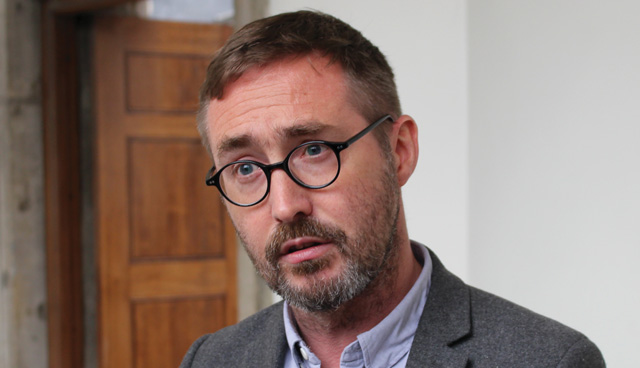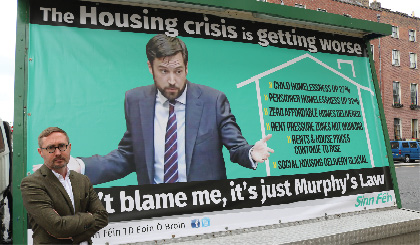Bringing it home: Eoin Ó Broin TD


Eoin Ó Broin is regarded as one of Sinn Féin’s ‘bright young things’; one of the ‘new guard’ which has come of age and ascended rapidly to occupy positions of prominence. In reality, Ó Broin’s party political origins can be traced back to the mid-90s when he first gravitated towards Sinn Féin. Ciarán Galway meets with the party’s housing spokesperson to discuss his critique of government policy.
Educated privately in Blackrock College before attending Crown Woods Comprehensive in London, Ó Broin completed his undergraduate studies in the then Polytechnic of East London. It was here, as a young Irishman in early 90s London, that he became politicised. A growing awareness of the conflict and the associated politicking of the peace process, combined with his involvement in trade unionism, drew him towards Sinn Féin.
In 1995, the Cabinteely native relocated to Belfast where he remained for 11 years, working full time for the party and completing an MA in Irish Politics at Queen’s University.
Facing UDA threat as a Belfast City Councillor, Ó Broin represented the Oldpark District Electoral Area, incorporating some of the most deprived wards in the North, from 2001 to 2004 – a time of high tension in north Belfast, which was epitomised by the Holy Cross dispute (when loyalists violently picketed a local Catholic girls’ primary school).
Now a TD for Dublin Mid-West (topping the poll in 2016), in his role as an opposition spokesman for housing, Ó Broin has become an outspoken critic of Minister Eoghan Murphy. At the same time though, he emphasises: “For me, the fundamental thing is that the housing crisis wasn’t created in the last five years. It wasn’t created by this Government. Although, many of the things that this Government is doing is making it worse.”
Crisis
Contending that the seeds of the housing crisis were sown over “three or four decades”, he asserts that at the core of that problem are two policy mistakes.
“I think it needs a serious conversation about how we move away from this dysfunctional system, which wasn’t created by landlords or tenants. It’s really a responsibility of the failure of government…”
“The first is a withdrawal of the State from the direct provision of public housing. When I say public housing, I mean for a very broad range of people in employment categories.
“The flipside of that, therefore, is an overreliance on the private rental sector and the private sector to meet a variety of forms of housing need.”
The problem, he suggests, stems from a combination of the “inherent instability” of the private sector and the actuality that for “a very significant cohort of people”, the private market, left to its own devices, will never meet their need. Those included in this category by Ó Broin are people with modest or average incomes, those in precarious employment and the unemployed.
Social housing
Describing the current system as “fragmented, underfunded, badly regulated and dysfunctional”, the Sinn Féin TD contends that the solution is “a decade-long project”.
“If you want a stable housing system, you have to recognise that there is a large portion of that system that cannot be in the market – it has to be outside of the market. That doesn’t mean that it’s all subsidised – a lot of it can be provided at cost – but this would ensure that a segment of society has its housing needs met through non-market housing, delivered, in the first instance, by the State or not-for-profit approved housing bodies and co-ops.”
Ó Broin also insists that now is the time to rethink social housing and recalibrate relationships to end the perception of social housing as the most residual housing for society’s poorest. Instead, he argues, it should be typified by “State-led, integrated mixed-income, mixed-tenure estates which are great places to live. That everyone from the university student, to the garda, the teacher, the nurse, the TD, the part-time single mum and the unemployed family can live”.
Reflecting upon the fact that such a goal had been within touching distance in previous periods of our history, he suggests that to do so now will require “a fundamental change in the way in which government thinks about housing and the role of the State in housing, backed up by a fundamental shift in the levels of investment to make that achievable”.
“Unless the State realises that its job isn’t to look after 8 per cent of the housing system, it’s job is to look after 25-30 per cent of the housing system, all of the other problems are going to continue because they are just symptoms of this more fundamental policy failure.”
Rental market
While acknowledging that private home ownership is “very important and will always be a big feature of our system”, Ó Broin advocates for a properly regulated private rental market that works for landlords and for tenants alike.
Speaking anecdotally, the Dublin Mid-West TD outlines: “I would be of the strong view that the vast majority of landlords are good landlords – they are people who are providing good accommodation, at relatively affordable prices and they’re trying to do the right thing.”

Even those that are in contravention of regulation, he hypothesises, are not necessarily doing so intentionally or out of greed. “It could be that they are accidental landlords, they don’t understand the law, they’re managing difficult financial circumstances themselves in terms of high levels of mortgage and mortgage arears and all the rest of it.”
Overall, while acceeding that there are bad landlords within the system, Ó Broin argues the problem is not with them, but with poor regulation of the system. “We have a very large number of accidental, non-professional landlords. It doesn’t make them bad people or mean that they don’t rent decent places to live,” he says.
According to Ó Broin, an acceptance of the requirement for a large, professional and well-regulated private rental sector “must be an integral part of our housing system”. He envisions an improved sector which provides high quality, secure, affordable accommodation for people to rent, while enabling landlords to make a reasonable return on the service that they provide.
“I think it needs a serious conversation about how we move away from this dysfunctional system, which wasn’t created by landlords or tenants. It’s really a responsibility of the failure of government to have managed this before we got to 330,000 tenancies.
“It is going to require greater regulation, greater support, changes on both the tenant and landlord end and if our public discourse is all about bad, greedy landlords and an end to landlordism, we aren’t going to fix the problem.”
Professionalism
The Sinn Féin housing spokesperson proposes additional support and assistance to enable ‘accidental’ landlords to become more professional and submits that their tax treatment is disadvantageous compared to real estate investment trusts, Irish Collective Asset-management Vehicles (ICAVs) and the real estate investment trusts (REITs).
“You have a bizarre situation in which a small landlord can be paying an effective rate of tax on their rental income of 55 per cent and a REIT, located overseas with its property portfolio constructed in a particular way, is paying zero tax on its rent roll, capital gains or dividend withholding tax. That makes no sense.”
Simultaneously, Ó Broin highlights the subsidies received by accidental landlords, such as the mortgage interest relief at 80 per cent. “That’s a big taxpayer support for private landlords and sometimes when I hear them arguing for greater tax relief, I wonder if the current cost to the taxpayer, through the tax reliefs which are already out there, is understood.”
Equally, in his summary, he suggests that this professionalisation must provide a reciprocal benefit to tenants. “While we do have better regulation in terms of the security of tenure and rent stability than other jurisdictions, there are still too many gaps and loopholes.
“Okay, we have Part Four tenancies [under the Residential Tenancies Act 2004] for six years, but there are too many ways of getting out of those. Sure, we have rent pressure zones, but the policing of them is complicated and they don’t exist everywhere that they should. Likewise, a 4 per cent annual increase over three years is 12.5 per cent and I don’t know anyone who is going to get a 12.5 per cent wage increase over the next three years. So, we have some of the bones of a good regulatory system but there are many weaknesses.
“At the moment, any talk of rent security is perceived to be anti-landlord. But if we had been talking about rent security when rents were plummeting through the floor, it would have been beneficial to landlords. So, over the long cycle, what we want to stop is dramatic peaks and troughs in rents and that’s why I do believe in rent certainty, in terms of linking rent reviews to an index, whether it’s the Consumer Price Index or the CPI modified, that gives security to everybody in the long-term.”
No confidence
In spite of his party’s scathing criticism of the Housing Minister, Ó Broin has yet to table a motion of no confidence against Murphy. Such a measure can only be tabled once every six months and as it became increasingly apparent that Fianna Fáil would not support the speculative motion, the party “took a tactical decision that we would not table it at that point of time”.
“We have consistently said that we don’t have confidence in him, we don’t think he’s the right person for the job. That isn’t about personalising it around him, it is about holding him to account as the individual ultimately responsible. But the motion of no confidence is still on the table and when we think the time is appropriate and right, we won’t shirk from that responsibility.”
As an opposition spokesperson, Ó Broin outlines that when a new minister is appointed, it is entirely possible that they may subsequently prove to be exceptionally competent. This competency, he argues, did not materialise with the incumbent Housing Minister.
“What I’ve come to decide in the 12 months that I have observed and tracked Eoghan Murphy is twofold. Firstly, it’s the wrong policy and secondly, I don’t think he is the right guy for the job. I don’t think he grasps or gets it.”
The Dublin TD identifies “the scandal around the homelessness figures” and his assertion that “the Minister took advantage of an opportunity to meddle with those figures for political reasons” as the turning point in his scrutiny of Murphy.
“That was the point I realised that this is a guy who is putting the politics of presentation ahead of how we tackle the crisis. Okay, statistics are important, the children in emergency accommodation are important – but if you’re not measuring [them] properly and you’re tampering with the agreed measurement for political ends, I think that says something about you.
“Of course, if he changes tomorrow, we still have the bad policy of Rebuilding Ireland. There has to be equal focus on the policy,” he adds.
“What I am absolutely convinced about is that Rebuilding Ireland repeats all of the same mistakes as Alan Kelly’s Social Housing 2020, the core housing policies of Fianna Fáil from 1997 to 2010 and of the governments before that. This is an overreliance on the private sector in a variety of forms and this constant privileging of private home ownership as the only form of tenure.”
The Sinn Féin alternative, as outlined by Ó Broin, incorporates two core principles: incorporating the right of housing in the Constitution and equality.
“It’s not just about volume. It’s not just about sustainable and vibrant communities. It’s about housing as a right, allocated on the basis of need and with equality at the very centre.
“There is no other major party in the State who is making that overall argument and also making that argument in a fully costed way that is deliverable and achievable and I think that’s what marks us out as being different from Fianna Fáil and Fine Gael.”
“What I’ve come to decide in the 12 months that I have observed and tracked Eoghan Murphy is twofold. Firstly, it’s the wrong policy and secondly, I don’t think he is the right guy for the job. I don’t think he grasps or gets it.”
Ireland 2040
Unpacking a comprehensive analysis of Ireland 2040, encapsulating both the National Planning Framework (NPF) and the National Development Plan (NDP), Ó Broin concludes with a brief synopsis of his assessment.
“My straight answer is that I’m very concerned about what we know is going to happen between now and 2021 because it is nowhere near what is required to meet affordable social housing need. I’ve no idea what is going to happen after 2021, but I fear it is going to be more of the same. Post-NDP, into the NPF, it’s too ambiguous,” he affirms.
Conceding that “there are some decent ideas in the NPF”, the Sinn Féin TD agrees with the concept of concentrated growth within urban centres. However, he maintains that we must break the paradigm of merely constructing two-storey, semi-detached or terraced houses.
“We do need to move towards sustainable apartment living, but that requires not merely good-quality units, but also public transport infrastructure, parks and schools.
“We also need to look at housing developments, not only in terms of being planning-proofed, but to be demography-proofed. For example, we don’t build enough one bedrooms or five bedrooms. We have propensity to build two or three bedrooms. If you look at local authority housing waiting lists, one third of them are singles. How many singles are we building in the social housing pipeline? It’s not one third.
“There are some sensible things in the planning framework in terms of the broad parameters, but the crucial thing is that that aspirational stuff is meaningless unless there is real public investment to deliver that kind of accommodation and I don’t see that,” he concludes.






